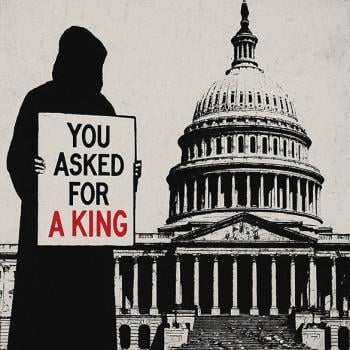A recent study released by The Pew Forum on Religious and Public Life found that one in five adults in the United States now claim no religious affiliation, 46 million people all together.
While many people look at these statistics and see a bleak future for believers, it occurs to me that perhaps there is a silver lining in this growing number of "nones," as some like to call them.
First, in previous Pew surveys, most people who rarely or never practiced their faith still identified with a faith tradition. Now, numbers show these people are more comfortable admitting they do not have a faith affiliation. This is not so much a drastic change in the faith landscape of the United States as much as it is a sign that people are comfortable shedding faith labels. Is this, in and of itself, a bad thing? Do we really want disaffected Christians hiding behind labels and pretending simply because they want to conform? Or is it better to have a more realistic picture of our faith landscape?
Also, over the past ten years, the Pew surveys have found a decline in the number of people who say that they never doubt the existence of God. Whew, that's a relief! If a person can say that they have never doubted the existence of God, I would politely suggest that they are either lying or they have not thought enough about it. Doubt is a comforting sign of growth in mature faith. Questions can lead a person away from God to be sure but they also lead a person much deeper into the mystery of faith.
As the Catholic Church kicks off The Year of Faith, there is no need to view the faith landscape in the U.S. with despair, but rather as a challenge. These growing numbers of people who do not claim a religion are people who are comfortable with doubt. They see the complexity and mystery of the world and choose to walk away from self-assured faith because they feel free to admit that they do not have it. There is humility and, in a certain sense, a recognition of truth in this way of viewing the world.
If, as believers, we can demonstrate comfort with mystery, if we can discard the cloak of a counterfeit, overly confident faith that serves as false security, then we will be able to engage with those who no longer find themselves able to identify with a faith tradition that seems so sure of itself amidst a world so full of uncertainty.
Most importantly, integrating and accepting doubt in our faith life will bring us closer to God—the very mountain of mystery.
Tomas Halik, in his insightful book Patience with God, challenges Catholics:
Does this not suggest a new and yet unused path to meet in a much more radical way than ever before the challenge of the last Vatican Council: to engage in dialogue with the atheism of our time . . . to utterly de-demonize "unbelievers" and reinterpret at least a certain kind of "unbelief" as a view "from the other side" of the steep, "cloud-covered" mountain peak of the impenetrable divine mystery? To show atheism not as a lie, but as an incomplete truth?
In The Year of Faith, it is important that we do not frame it as Believers vs. Nonbelievers or Those Who Have the Gift vs. Those Who Got Coal in Their Stockings. It is just as important to embrace doubt and mystery as it is to wave Vatican flags, read our Catechisms, and study what we believe. If we explore our doubts while at the same time holding them lightly, we will demonstrate a credible witness to the growing numbers of nonbelievers and those who have left the faith.
We can only be credible if we give all the credit to God. We believe, not because our minds have grasped this Truth that is beyond our understanding, but because God has revealed himself to us and to the world through Jesus.
12/2/2022 9:05:39 PM




